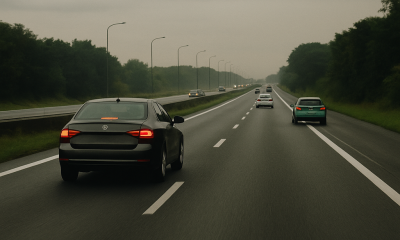Articles
Why Distracted Driving is Overtaking Speeding as the Leading Road Killer

In Nigeria, much of the road safety conversation has historically centered on speeding, rightly so, as it accounts for a significant proportion of fatal crashes.
Also Read: Phone Distractions: The Silent Killer on Lagos Roads
Yet, beneath the surface, another epidemic is silently claiming lives at an alarming rate: distracted driving. From drivers scrolling through WhatsApp messages, taking TikTok videos behind the wheel, eating suya on steering, or even adjusting makeup during Lagos traffic, distractions are now proving deadlier than speeding in several regions.
The New Road Killer
Recent World Health Organization (WHO) findings and studies from the Federal Road Safety Corps (FRSC) reveal that distracted driving contributes to an estimated 18–22% of serious crashes in Nigeria, rivaling global averages. In states like Lagos, Rivers, and Abuja, distraction-related accidents have doubled in the past five years, often surpassing speed-related crashes during peak traffic hours.
Unlike speeding, which is visible and enforceable via speed guns, distractions are harder to catch. A driver can appear compliant at 50 km/h but is still dangerous if their eyes are on a phone instead of the road.
Real-Life Case Studies
Lekki-Epe Expressway, 2024: A Toyota Corolla driver, distracted while filming a Snapchat video, swerved into an oncoming tanker, resulting in a four-car pile-up that left 3 dead and 7 injured.
Abuja Airport Road, 2023: A banker on a video call veered off the highway into a drainage channel, narrowly escaping death but causing gridlock for hours.
Port Harcourt, 2022: A distracted truck driver eating behind the wheel rammed into roadside traders, killing two instantly.
These stories show the human cost of what many Nigerians still dismiss as “small mistakes.”
Why Nigerians are Easily Distracted Behind the Wheel
1. High Smartphone Usage: Nigeria ranks among the top 10 countries for mobile internet usage in Africa, making phones constant companions.
2. Traffic Stress: With Lagos and Abuja ranked among Africa’s worst congested cities, drivers often use downtime to scroll through social media, not realizing the sudden stop-start risk.
3. Cultural Laxity on Road Laws: While speeding fines exist, few laws directly penalize distracted driving in Nigeria. This gap fuels risky habits.
4. Poor Awareness Campaigns: Unlike campaigns against drunk driving, there is little to no nationwide sensitization on distractions.
Global Comparisons
In the United States, distracted driving kills an estimated 3,000 people annually, prompting states to introduce “hands-free” laws. In South Africa, similar enforcement is now reducing deaths. Nigeria lags far behind in implementing such laws.
The Cost of Distraction
Lives lost: Thousands of preventable deaths yearly.
Economic impact: According to the National Bureau of Statistics (NBS), road crashes drain over ₦450 billion annually from the economy.
Psychological scars: Survivors and families live with trauma long after the accident.
Solutions Nigeria Needs Now
1. Legislation: Urgent introduction of hands-free laws with real penalties for phone use while driving.
2. FRSC Tech Enforcement: Use of dashcams, CCTV, and AI monitoring in cities like Lagos and Abuja.
3. Public Education Campaigns: Nationwide media push similar to the anti-drunk driving campaigns of the 2000s.
4. Corporate Policies: Uber, Bolt, and fleet managers should adopt strict “no distraction” clauses for drivers.
5. Personal Discipline: Drivers must learn that no call, message, or video is worth a human life.
Conclusion
The silent epidemic of distracted driving is fast overtaking speeding as Nigeria’s biggest road killer. If left unchecked, this habit could worsen Nigeria’s already dire road fatality statistics. It is not enough to control speed; Nigeria must also take the war against distraction seriously.



















